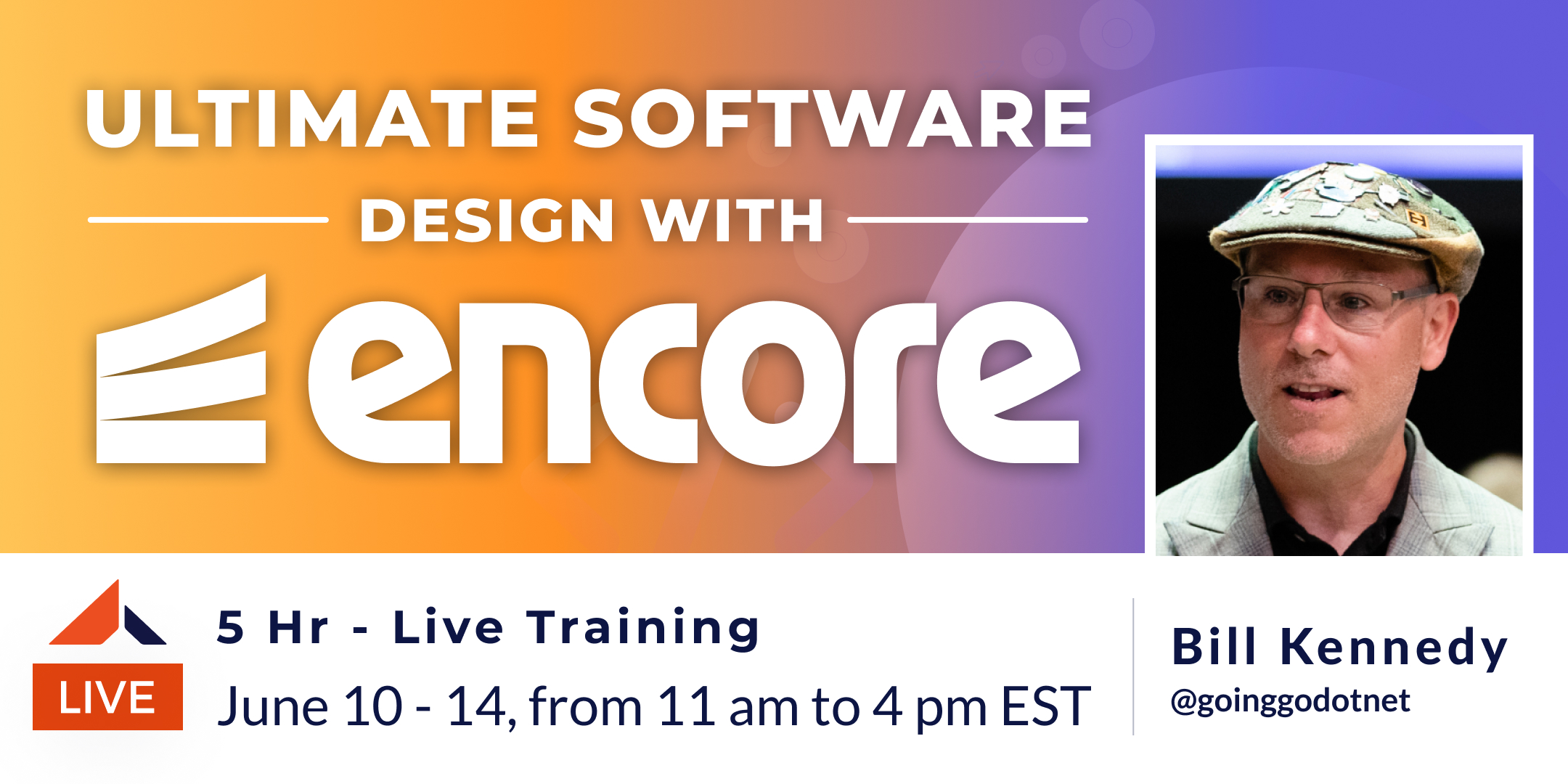

Ultimate Software Design with Encore
Jun 10th, 2024
11:00AM - 4:00PM EST
Remote
This course teaches you how to build production-level services in Go, leveraging the power of a Domain Driven, Data Oriented Architecture deployed in Encore.
Price: $300 - $595
Enroll NowWhen: June 10th - 14th, 2024
Schedule: 5 Days/ 5 Hours, from 11am to 4pm EST (GTM - 5)
Where: Online - Zoom Meeting
We have a special offer running for this training: GET 2 TICKETS for the PRICE OF 1
Ticket Prices:
- 2 FOR 1 - Pay $600 and Get 2 Seats: $300 Each
- Individual Ticket Holder - $595
NOTE: If you want a 2x1 ticket but don’t have someone, send us an email, and we will pair you for the reduced price.
Description: This course teaches you how to build production-level services in Go, leveraging the power of a Domain Driven, Data Oriented Architecture deployed in Encore. From the beginning of the course, you will pair-program with your instructor Bill Kennedy as he walks you through the design philosophies, architectural decisions, and best practices as they apply to engineering a production-ready Go service.
With each new feature that is added to the service, you will learn how to deploy and manage the Kubernetes environment used to run the service. Throughout the class, the code being worked on is pushed to a repository for personal access and review.
For further class information, please see the class schedule or review the self-study options.
What a student is expected to learn:
1.0 - Introduction
Introduction to the class and all the engineering that you will learn.
- 1.1: Design Philosophy, Guidelines, What to Expect
- 1.2: Tooling and Images to Install
2.0 - Deploy First Mentality
We begin to build the service with a focus on the ability to deploy the service in Kuberenetes.
- 2.1: Project Layers, Policies, and Guidelines
- 2.2: Prepare Project
- 2.3: Build Encore Service with Logging
- 2.4: Add Test API Handler
- 2.5: Deploy to Encore Cloud
3.0 - Finish Initial Service Startup/Shutdown
We finish the initial startup and shutdown of the service.
- 3.1: Configuration
- 3.2: Debugging / Metrics
4.0 - Middleware
We add middleware functions for business-level logic that needs to be injected into the processing of requests.
- 4.1: Panic Handling
- 4.2: Metrics
5.0 - JSON Web Tokens (JWT) and Open Policy Agent (OPA)
We gain an understanding of how JWT’s work and their shortcomings. We also learn about OPA and how we will use it to perform the actual authentication and authorization.
- 5.1: Understanding JWT
- 5.2: Private/Public Key Generation
- 5.3: Token Generation
- 5.4: Token Signature Validation with OPA
6.0 - Encore Secrets
We create add a secret for the private key.
- 6.1: Secret Support
7.0 - Authentication / Authorization
We integrate authentication and authorization support into the project by developing a packages to generate and validate tokens. Then we integrate the packages into the application and test things are working.
- 7.1: Auth Package
- 7.2: Auth Unit Test
- 7.3: Add Middleware
- 7.4: Auth Service
8.0 - Domain Driven, Data Oriented Architecture
We talk about the data driven data oriented architecture that is implemented in the project. We discuss the design philosophy, guidelines, and semantics of how the three layers of App, Business, and Storage work together.
- 8.1: Architecture Review
- 8.2: Data Flow Trust vs Non-Trust
9.0 - Database Support
We add a Postgres database to our Encore environment. Then we write a small database package that provides support for using the SQLx package more effectively. Finally, integrate the database package on application startup.
- 9.1: Encore Support for Postgres
- 9.2: Create Database Package
- 9.3: Update Readiness Handler to Perform DB Checks
10.0 - Database Migrations and Seeding
We define our schema and provide support for migration schema changes over time. We also provide support for seeding the database. Finally, we add support in Encore to run the migration and seeding on POD startup.
- 10.1: Maintaining Database Schemas and Seeds
- 10.2: 10.2: Admin Tooling and Init Containers to Automate Migrations
11.0 - API, App, Business, and Storage Domain Implementation
We implement the User domain inside the App, Business, and Storage layers.
- 11.1: User Business Domain Support
- 11.2: User Storage Domain Support
- 11.3: User App Domain Support
- 11.4: User API Domain Support
12.0 - Testing
We add docker and unit testing support for writing tests against a real database and write the actual user package tests.
- 12.1: Starting and Stopping Containers
- 12.2: Database Testing Support
- 12.3: Unit and API Testing Support
- 12.4: Write User Business Test
- 12.5: Write User API Tests
13.0 - Delegate and Transactions
We talk about how the delegate and transaction systems work.
- 13.1: Delegate System
- 13.2: Transaction System
14.0 - Review Service Project
Review service project and get it running
- 14.1: Check For Dependcy Upgrades, Rebuild, Run
Prerequisites:
It is expected that you have been coding in Go for several months.
A working Go environment running on the device you will be bringing to class.
Please clone the main repo for the class.
Please read the instructions in the makefile for installing everything before coming to class.
Please email the instructor, Bill Kennedy, for assistance.
Computers should be capable of modern software development, such as access to install and run binaries, install a code editor, etc.
Why Engineers & Teams Trust Ardan Labs
From the Lab
Where ideas get tested and shared. From the Lab is your inside look at the tools, thinking, and tech powering our work in Go, Rust, and Kubernetes. Discover our technical blogs, engineering insights, and YouTube videos created to support the developer community.
Explore our content:
Everything You Wanted to Ask About Rust – Answered by Herbert Wolverson
Updated on

Ardan Labs
Build, Connect, Grow: Ardan Labs’ 2025 in Review
Updated on

Ardan Labs











